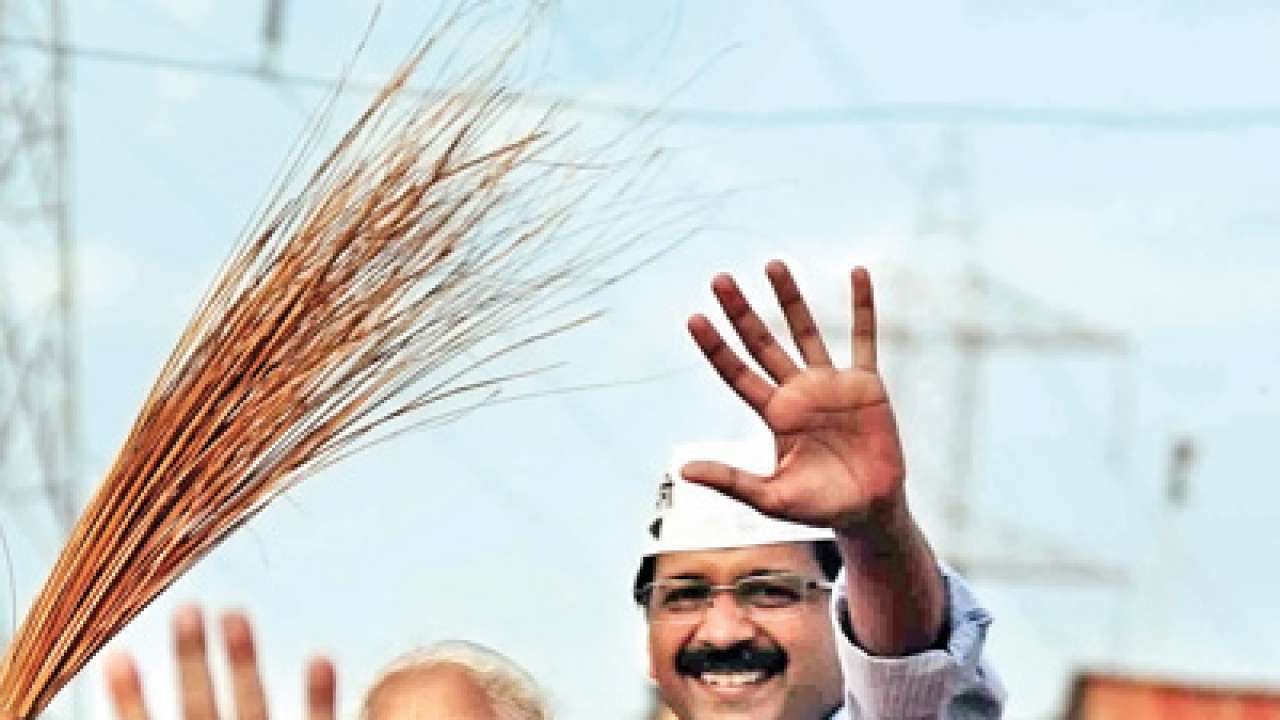
The good news about the Aam Aadmi Party is that there is finally a hint of slowing down and an inclination towards course correction. The bad news is that the change has come far too late. Politics, as the art of the possible, does offer people a second chance. But, Arvind Kejriwal needs redemption and that seems well beyond the realm of possibility going by the current state of the party.
Ahead of the Delhi Assembly elections on December 8 last year and in preparing for the General Elections, the AAP had shown a cussedness for standing its ground, was plucky or foolhardy enough (or both) to plough a lonely furrow, and had made a virtue of having a vested interest in not having a vested interest. This got the party significant traction and succeeded in changing the nature and content of political discourse at the time -- which was disconcerting for the principal political parties. Those very qualities suddenly look hollow. What stands out in the public perception now is a party with a shrill leader, leading a deeply fragmented organisation which is beginning to unravel and lose its voice because of its over-ambition and lack of focus. From being regarded as a serious and courageous leader who spoke about auditing the power companies and bringing swaraj at the local community level besides being proactive on nursery admissions and water scarcity, he now risks looking like a frivolous politician.
To find out why the sort of cussedness that earlier contributed to his mass appeal could be a roadblock in the reinvention of the party, a recent Kejriwal interview provides an answer. Asked whether he should have focused on Delhi, his main support base, instead of wagering everything on his Varanasi face-off with Narendra Modi, he drew a distinction between political strategy -- which would have got him to campaign in Delhi and elsewhere -- and the need to break the alleged tacit understanding between the big parties not to field important leaders against each other. What remained unsaid was that the giant killer had started believing in his own myth after defeating Sheila Dikshit in the Delhi Assembly elections, and imagined he could win an election against anyone.
What he has missed and is paying for is something that politicians know about even though most rarely know what to do about it: the ever-changing nature of politics that requires new strategies every once in a while. And the need to grab an opportunity with both hands when it comes. Kejriwal did neither.
The AAP had succeeded in a controlled environment which Delhi provided. Elections can be fractious and bruising in Delhi, but being the national capital and much smaller geographically than other states, it does not suffer from the drawbacks of large states in the cow belt like Uttar Pradesh, Madhya Pradesh, Rajasthan and Bihar in terms of caste and communal politics. The issues tend to be different in a prosperous city with high per capita income, and a politically aware electorate which comprises a large chunk of government employees. Poor governance, for instance, upsets people in the Capital. In defeating former Chief Minister Dikshit, Kejriwal was able to harness the anger against both the Delhi Government and the UPA at the Centre in the state polls. His unexpected and early exit from government over what many -- except of course his diehard supporters -- saw as a frivolous issue made him, instead, the focus of public anger.
The BJP, which had then appeared to struggle to raise the tempo of its national campaign even after Narendra Modi was declared the party's prime ministerial candidate (it had led to suggestions that he may be over exposing himself and running the risk of peaking too early) was now the only party that would benefit from the public anger against the UPA. Obsessed with his own version of principled politics and spurred by his continuous search for an enemy, Kejriwal and the AAP seemed not to have noticed the altered situation. Hence, when the elections came, it fielded 434 candidates and generally focused its energies on the Varanasi campaign. It's rare to find anyone who would justify such a decision especially after 414 candidates forfeited their deposit.
Some like Capt GR Gopinath and Rajeev Chandrasekhar obviously thought it was no longer worth their while to give the AAP too much time and decided to part ways with the party, on their own terms but without making too much noise. As recent events have shown, this is not the case with others, whether ordinary party workers or senior members. And with each such incident, the party slips one notch in public estimation.
The way forward for the AAP is to keep the focus, for now, on its core area of work: Delhi. Some party MLAs have already started to do the right thing, by reaching out to their constituents and beginning the work from scratch. But, this time there is no tailwind of public anger against an incumbent government to hasten the journey. It is uphill from here. For his part, Kejriwal, by far the pre-eminent leader in the party, must focus on work on the ground. To stay in an agitational mode, which even some party members aren't convinced about -- like refusing to take bail in the Nitin Gadkari defamation case -- serves little purpose. He must realise that he can be a martyr in politics only once, not on a daily basis. The present irrelevance of his 'guru' Anna Hazare after the high of the Jan Lokpal Bill campaign of 2012 should provide cause for introspection about his future agenda.
The writer is a political commentator